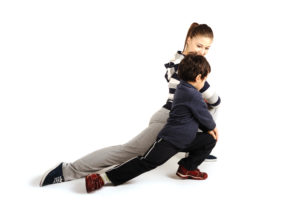Parent Question: “When is enough, enough in terms of having kids and teens in multiple sports and activities? When should I say “no?” I don’t want my children to miss any opportunities.”
 Let’s talk about that word “opportunities.” It’s something we parents generally think of as a good thing for our kids. Opportunities to grow, opportunities for change, opportunities we never had. The problem is that not all opportunities are good ones. Then, some are better than others, and some “opportunities” get in the way of one thing that really matters in life: relationships.
Let’s talk about that word “opportunities.” It’s something we parents generally think of as a good thing for our kids. Opportunities to grow, opportunities for change, opportunities we never had. The problem is that not all opportunities are good ones. Then, some are better than others, and some “opportunities” get in the way of one thing that really matters in life: relationships.
So how do we know which opportunities are good for our family, and which ones aren’t? We determine this in the same way we determine on a trip which road is good for us to take and which one isn’t: we bring a map! A map is a tool we find BEFORE we begin making decisions along the way. In selecting a map, we need to know (at least) two things: 1) our starting point and 2) where we want to end up. That way, when we are wondering whether to turn left or right at a fork, we can consult our map, asking, “will this turn get me closer to my destination, or further away?” A map for making family decisions is called a family mission statement. A complete family mission statement is a single statement of the mission of your family, complete with smaller goals. A family mission statement is specific to a family. It can be complicated or simple, but it should be well thought out and flexible.
I know what you’re thinking; I can about read your mind. “Who has time to create a family mission statement?” I encourage you to think of all the time you’ll save in making decisions when you have a map to guide you! I’ve included a worksheet to help you through the mission statement process when you’re ready (click here). In the meantime, below are some tips that can help out with this question whether you’re creating a missions statement or not.
 TIP 1: Determine your child’s interest through BUY-IN. We thought it was the perfect camp for our son, and he was super excited. It had everything: the canoeing, the ropes course, the campfires, and (of course) the very high price tag. Our son was ecstatic about the idea, prancing around the house, talking about it nonstop, packing months early, etc. I thought he would do anything to go, and boy was I wrong! Because we were worried about loneliness (this would be our son’s first over-night camp), we asked him to write a plan for what he might do if he got homesick. We also asked him to write a couple reasons why he wanted to go to camp in the first place. We said (with very carefully picked wording), “If you would like to go to camp, here’s what we need from you by Friday…” Guess what? He didn’t do it! I became panicked as his deadline closed (way more panicked than he was!). He just shrugged his shoulders. And then he never did his part. Was he too immature to understand the ramifications? No. He just didn’t want to go that badly. Writing a few sentences wasn’t worth it. And he was fine with that choice because it was his. And as for his parents? We saved a boat load of money and a few hour drive.
TIP 1: Determine your child’s interest through BUY-IN. We thought it was the perfect camp for our son, and he was super excited. It had everything: the canoeing, the ropes course, the campfires, and (of course) the very high price tag. Our son was ecstatic about the idea, prancing around the house, talking about it nonstop, packing months early, etc. I thought he would do anything to go, and boy was I wrong! Because we were worried about loneliness (this would be our son’s first over-night camp), we asked him to write a plan for what he might do if he got homesick. We also asked him to write a couple reasons why he wanted to go to camp in the first place. We said (with very carefully picked wording), “If you would like to go to camp, here’s what we need from you by Friday…” Guess what? He didn’t do it! I became panicked as his deadline closed (way more panicked than he was!). He just shrugged his shoulders. And then he never did his part. Was he too immature to understand the ramifications? No. He just didn’t want to go that badly. Writing a few sentences wasn’t worth it. And he was fine with that choice because it was his. And as for his parents? We saved a boat load of money and a few hour drive.
What’s the point? Our children have to have buy-in. They have to pay a price… even if just a small one… for what they get in life. There are three reasons for this: 1) It proves to you AND your child that they really want it. It’s worth the sacrifice. 2) It helps a child feel like a contributor, which builds self-esteem. “I have the ability to work toward what I want” and “My parents think I’m a good problem solver” are the messages given when parents require buy-in. And, 3) parents are training children for adulthood. How many times do you ask for something and then just get it without giving anything in return? Not often! It is healthy and good for children to learn that this is how life works. So, before you sign up for that next event, sport, or activity, figure out which age-appropriate piece of the responsibility is something your child can take on.
TIP 2: Take DOWN-TIME seriously. There is a good amount of research on the effects of the increased pressure on our kids. The more activities, academic pressure, and general busy-ness, the greater the chances of depression, substance abuse, and suicidality. In a culture that promotes go-go-go, it takes forethought and intentionality to build into our kids the ability to care for themselves. Some families build in a Sabbath or a break day for the whole family, others model a “calm down” time in the evening that the entire family participates in. Still others allow each child to pick just one activity outside of school to be involved in. What can you do to show your kids that self-care is important enough to make time for consistently?

TIP 3: Build SELF-CARE SKILLS in children by modeling them yourself. What would it be like to tell our children, “I am not going to sign you up for that activity because I need that time to make sure I am emotionally healthy and able to be a good parent.” Would you feel guilty? Like your child was missing out because you were being selfish? Those are very common responses. However, if a parent is empty, how is that parent going to take care of anyone else? And who is going to show those children how to balance their lives and say “no” when life gets too full? It is a wonderful thing for our children to learn from us that saying “no” to one activity often means saying “yes” to something else more important.
 TIP 4: Teach your kids that FAMILY IS VALUABLE by insisting upon spending time together. What is the message behind saying “yes” to as many outside activities as possible? One unfortunate message is that family time is less important. According to a research study done at the University of Toronto, one of the best ways to help kids turn out well is to just spend quality time together. This study found that teens who spent about six hours per week engaged in family time abused drugs or alcohol less often and engaged in less risky and illegal behaviors. Anne Fishel, co-founder of The Family Dinner Project and professor at Harvard Medical School, has compiled the research surrounding the vast benefits of making sure to eat dinner together most nights (go ahead, Google it!). So, get creative and find some ways to create more family time, whether it be board game night, going on an evening walk, or starting a blue grass band (which your teens would love!).
TIP 4: Teach your kids that FAMILY IS VALUABLE by insisting upon spending time together. What is the message behind saying “yes” to as many outside activities as possible? One unfortunate message is that family time is less important. According to a research study done at the University of Toronto, one of the best ways to help kids turn out well is to just spend quality time together. This study found that teens who spent about six hours per week engaged in family time abused drugs or alcohol less often and engaged in less risky and illegal behaviors. Anne Fishel, co-founder of The Family Dinner Project and professor at Harvard Medical School, has compiled the research surrounding the vast benefits of making sure to eat dinner together most nights (go ahead, Google it!). So, get creative and find some ways to create more family time, whether it be board game night, going on an evening walk, or starting a blue grass band (which your teens would love!).
 TIP 5: Make sure your children’s BASIC NEEDS are met. I know, this sounds silly. Wouldn’t CYS be knocking at my door if my kids’ needs weren’t being met? Just think about it a moment, though: are our children so busy that they aren’t getting enough sleep at night? How many meals a week do we have to stop at the drive-thru on the way to events? Sleep and nutrition are very important for growing bodies, and if our families are too busy to provide these necessities at least most of the time, something’s gotta give!
TIP 5: Make sure your children’s BASIC NEEDS are met. I know, this sounds silly. Wouldn’t CYS be knocking at my door if my kids’ needs weren’t being met? Just think about it a moment, though: are our children so busy that they aren’t getting enough sleep at night? How many meals a week do we have to stop at the drive-thru on the way to events? Sleep and nutrition are very important for growing bodies, and if our families are too busy to provide these necessities at least most of the time, something’s gotta give!
TIP 6: Give your kids QUALITY time by making sure your schedule minimizes stress. The same studies that determine that family time is important for the emotional health of our children also show that the quality of the time spent together is important. For example, the family that manages to eek out six hours of “family time” this week but spends it frustrated by math problems or angry that those sweaty soccer clothes didn’t end up in the wash—this family is missing the point. If you have so many activities that you spend most of your down-time stressed and short with the kids, it’s time to dump some things.
 TIP 7: CHECK YOURSELF – Are you living vicariously through your child? You always wanted to be a starter on the basketball team, didn’t you. You can’t imagine her not attending prom; it’s prom! Your high school didn’t have a pool, and your son has this great opportunity to join swim team! When you are considering whether or not to add an activity into your child’s schedule (especially one that your child isn’t willing to buy-in to), check your own emotions at the door.
TIP 7: CHECK YOURSELF – Are you living vicariously through your child? You always wanted to be a starter on the basketball team, didn’t you. You can’t imagine her not attending prom; it’s prom! Your high school didn’t have a pool, and your son has this great opportunity to join swim team! When you are considering whether or not to add an activity into your child’s schedule (especially one that your child isn’t willing to buy-in to), check your own emotions at the door.
Parenting workshops and groups, private parent coaching and professional counseling are available to you. Call 412-366-1300 to schedule an appointment.
